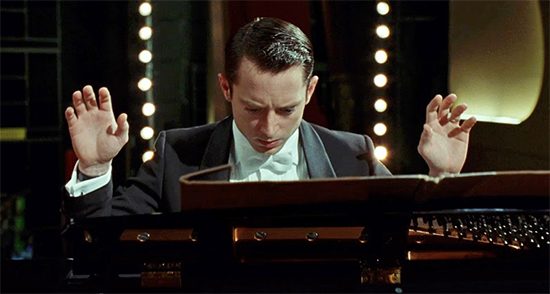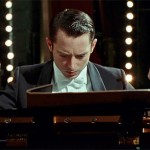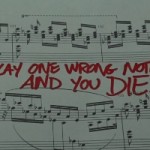It is not uncommon to experience a false sense of enlightenment when confined or placed into a stressful setting. You don’t always necessarily understand your surroundings or know how you arrived there, but you will, nonetheless, attempt to find meaning in the situation and overcome. Eugenio Mira’s Grand Piano tries for such an effect. The viewer is dropped into a concert hall full of mystery, however, one will find little on the proverbial playbill to provide any reasonable context.
Elijah Wood stars as Tom Selznick, an emotionally damaged concert pianist who comes out of retirement after five years to honor his late mentor. But once the keystrokes begin, Tom discovers that a sniper is watching his every move. And his wife.
Early on we meet Emma Selznick (played by the beautiful Kerry Bishé), but she serves little purpose other than to add style, and perhaps a little jealousy, to her husband’s magnificent return. Within fifteen minutes, the “unplayable piece” is referenced, which is complimented by another horrific cliché when the nervous pianist conducts a radio interview and says “Just another gig. Nothing else.” One man. One shot at redemption. The Unplayable Piece. Somewhere Don LaFontaine is smiling.
And so the stage is set for the enormously whiny and anxious Tom Selznick to hit the spotlight, which is when Grand Piano is smashed apart by its own questionable components that not even the best camera work of Mira’s can hide.
First, Tom Selznick is flat-out scared and not in a Woody Allen neurotic way. Tom Selznick is nervous but not like the lead character of Jacques Audiard’s piano-themed “The Beat That My Heart Skipped.” Given the mental state of the lead, it is completely laughable that he would somehow play better when an equally laughable note shows up on his sheet music stating: “Play one wrong note and you die!”
Play one wrong note and you die. There it is. The panicked pianist must somehow find a way to master “The Unplayable Piece” and save the day.
For one to buy the premise of Grand Piano as written by Damien Chazelle (who directed this year’s Sundance crowd-pleaser “Whiplash”), one has to accept the notion that Tom Selznick could conceivably play better under such intense pressure. It happens all the time in the movies. What you don’t typically see is an anxiety-ridden pianist receiving threats through an earpiece in his ear and with a red laser beam trained on his face. Such is the predicament of Tom Selznick, the only famous concert pianist in the world whose performances are not recorded. Perhaps the big twist in the film is that it’s actually set in the late 1700s when it was more difficult to notice red laser beams on the faces of celebrities.
Despite such a baffling, nonsensical plot, Grand Piano features a satisfying performance from Elijah Wood — his glances of horror could easily find their way onto a movie poster of any Dario Argento film. Kerry Bishé is somewhat of a minor revelation with her WOW factor and John Cusack, as the man behind the threats, is thoroughly underwhelming.
The film does benefit from an extravagant production design and a superb title sequence, but it’s clear something went terribly wrong in this Mira-Chazelle collaboration. One can appreciate the stripped-down narrative and the homage to classic thrillers, but its woefully written script may not only lead viewers to stop watching halfway through, it may also leave them insulted.






'Movie Review: Grand Piano (2013)' has no comments